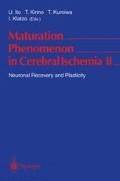Summary
Energy failure due to decreased blood flow induces various changes in the structural and functional integrity of the brain cells. After a certain degree of ischemia, the changes become irreversible and the tissues undergo pan-necrosis. This activates a cascade of inflammatory response which scavenges the damaged cells in areas of impending infarction through liquification and phagocytosis. Induction of the immune response further accelerates disintegration of the damaged cells. Recent reports suggest that this inflammatory response may over-kill brain cells, enhancing the area of damage caused by the primary ischemic insult. Anti-inflammatory agents have been found to effectively decrease the size of the infarct in animal models of ischemia. Further research of inflammatory response in the ischemic brain may yield a new target for the therapy of cerebral ischemia.
Access this chapter
Tax calculation will be finalised at checkout
Purchases are for personal use only
Preview
Unable to display preview. Download preview PDF.
References
Abe K, Tanzi RE, Kogure K (1991) Selective induction of Kunitz type protein inhibitor domain containing amyloid precursor protein mRNA after persistent focal ischemia in rat cerebral cortex. Neurosci Lett 125: 172–174
An G, Lin TN, Liu JS, Xue JJ, He YY, Hsu CY (1993) Expression of c-fos and c-jun family genes after focal cerebral is cerebral ischemia. Ann Neurol 33: 457–464
Benveniste H, Drejer J, Schousboe A, Diemer NH (1984) Elevation of the extracellular concentrations of glutamate and asparate in rat hippocampus during transient cerebral ischemia monitored by intracerebral microdialysis. J Neurochem 43: 1369–1374
Benveniste H (1992) Inflammatory cytokines within the central nervous system: sources, function and mechanism of action. Am J Physiol 263: C1–16
Kato H, Liu Y, Araki T, Kogure K (1991) Temporal profile of the effects of pretreatment with brief cerebral ischemia on the neuronal damage following secondary ischemic insult in the gerbil: cumulative damage and protective effects. Brain Res 553: 238–242
Kinouchi H, Sharp FR, Hill MP, Koistinaho J, Sagar SM, Chan PH (1993) Induction of 70-kDa heat shock protein and hsp70 mRNA following transient focal cerebral ischemia in the rat. J Cereb Blood Flow Metab 13: 105–115
Kinouchi H, Sharp FR, Chan PH, Koistinaho J, Sagar SM, Yoshimoto T (1994) Induction of c-fos, junB, c-jun, and hsp70 mRNA in cortex, thalamus, basal ganglia, and hippocampus following middle cerebral artery occlusion. J Cereb Blood Flow Metab 14: 808–817
Kitagawa K, Matsumoto M, Tagaya M, Hata R, Ueda H, Niinobe M, Handa N, Fukunaga R, Kimura K, Mikoshiba K, Kamada T (1990) Ischemic tolerance phenomenon found in the brain. Brain Res 528: 21–24
Li Y, Chopp M, Zhang ZG, Zhang RL, Garcia H (1993) Neuronal survival is associated with 72kDa heat shock protein expression after transient middle cerebral artery occlusion in the rat. J Neurol Sci 120: 187–194
Lindquist S, Craig EA (1994) The heat shock protein. Annu Rev Genet 22: 631–677
Matsuo Y, Onodera H, Shiga Y, Shozuhara H, Ninomiya M, Kihara T, Tamatani T, Miyasaka M, Kogure K (1994) Role of cell adhesion molecules in brain injury after transient middle cerebral artery occlusion in the rat. Brain Res 656: 344–352
Mitani A, Yanase H, Sakai K, Wake Y, Kataoka K (1993) Origin of intracellular Ca’ elevation induced by in vitro ischemia like condition in hippocampal slices. Brain Res 601: 103–110
Petito CK, Chung MC, Verkhovsky LM, Coopwe AJL (1992) Brain glutamine synthetase increases following cerebral ischemia in the rat. Brain Res 569: 275–280
Siesjo BK, Bengtsson F (1989) Calcium fluxes, calcium antagonists, and calcium related pathology in brain ischemia, hypoglycemia, and spreading depression: a unifying hypothesis. J Cereb Blood Flow Metab 9: 127–140
Shiga Y, Onodera H, Matsumoto Y, Matsuo Y, Kogure K (1992) Cyclosporin A protects against ischemia reperfusion injury in the rat brain. Brain Res 595: 145–148
Thilmann R, Xie Y, Klehues P, Kiessling M (1986) Persistent inhibition of protein synthesis precedes delayed neuronal death in post ischemic gerbil hippocampus. Acta Neuropathol 71: 88–91
Yamasaki Y, Suzuki T, Yamaya H, Matsuura N, Onodera H, Kogure K (1992) Possible involvement of interleukin-1 in ischemic brain edema formation. Neurosci Lett 142: 45–47
Author information
Authors and Affiliations
Editor information
Editors and Affiliations
Rights and permissions
Copyright information
© 1997 Springer-Verlag Berlin Heidelberg
About this paper
Cite this paper
Kogure, T., Yamasaki, Y., Matsuo, Y., Kogure, K. (1997). Impending Cerebral Infarction and Inflammatory Response: A Possible Target for Therapeutic Intervention. In: Ito, U., Kirino, T., Kuroiwa, T., Klatzo, I. (eds) Maturation Phenomenon in Cerebral Ischemia II. Springer, Berlin, Heidelberg. https://doi.org/10.1007/978-3-642-60546-8_16
Download citation
DOI: https://doi.org/10.1007/978-3-642-60546-8_16
Publisher Name: Springer, Berlin, Heidelberg
Print ISBN: 978-3-540-61673-3
Online ISBN: 978-3-642-60546-8
eBook Packages: Springer Book Archive

